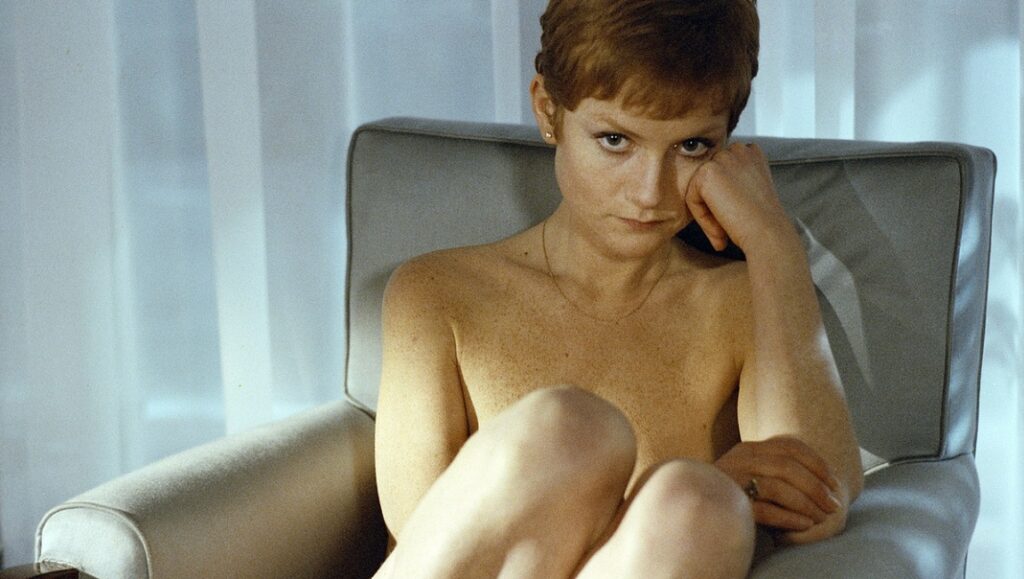“A little more passion, though, would have been appreciated.” So says Dave Kehr of American — by way of London by way of France — director Joseph Losey’s Mr. Klein, his 1976 film of Nazi ascendency and distorted identities. Losey liked images that were cool to the touch, all the emotional angles sanded down to properly observe and catalogue the psychology therein, which has clinched his status as something of a rightful genius who was kneecapped as much by his own ponderousness as he was by his McCarthyism abetted exile. It’s an issue even he had repeatedly acknowledged — his career-spanning book of interviews with Tom Milne is essential just for his self-directed frankness, a judicious parceling of successes and failures, often housed within the same film.
Losey’s filmmaking thus exists as a compelling grab-bag of stirring performances (Dirk Bogarde, Van Heflin, Jeanne Moreau, Alain Delon), thoughtful flourishes, and hermetic import, closed-off even as it takes great formal pains to invite one in. This belabored unknowability occasionally runs contrary to certain films’ conceits — Accident, Secret Ceremony — but when it occupies the actual narrative center, instead of stalking the perimeter, it’s revelatory, such as in Losey’s penultimate film, 1982’s La Truite (The Trout). Isabelle Huppert, in an icily prototypical performance, is Frédérique, whose blankness veils her otherwise upfront fiscal-via-emotional manipulations, men confusing her cipher-like qualities for genuine flirtatiousness.
Ancillary detail is burrowed within the surroundings: the family trout farm where Frédérique works is populated by lecherous family “friends” who unabashedly enact dalliances in plain sight. In response, she vows to platonically hustle, getting whatever she wishes — all-expenses-paid trip to Japan, treatment for her gay, alcoholic husband (Galuchat, played by Jacques Spiesser), footholds in the business world — without ever giving herself up. Frédérique and Galuchat spend their evenings at a bowling alley, clearly staking out fresh lures, which brings them into orbit with financiers Rambert and Saint-Genis (Jean-Pierre Cassel and Daniel Olbrychski, respectively), and their wives/girlfriends, Lou and Mariline (Jeanne Moreau and Lisette Malidor). Losey’s unwrinkled direction, virtuosic in its long takes, but modest in its dispensation of such, paints this newly established series of relationships as anything but inorganic, even as it evolves into an intercontinental, distending polygon of stifled desire. Frédérique impulsively accepts Saint-Genis’ invitation to accompany him to Japan, and while he carries out varying generic business matters, she hangs with transplant socialites, shops, and picks up whoever she pleases, her nonexistent sense of embarrassment attracting a phalanx of men who rebuff any attempts to take her down a peg. When one of Saint-Genis’ high-class escorts decides to spill her drink all over Frédérique, the nonplussed grifter strips to her negligee, and marches out of the club, a conga-line of men in tow.
Losey’s penchant for nonlinear timelines seems initially abandoned in La Truite, but when Frédérique assumedly dreams of the farm on her flight to Japan a fourth of the way in, the family business then comes to be the site of flashbacks, despite it existing within the present moment at the outset. These dispatches from the past, while instructive toward how to internalize Huppert’s character, also churn up some of the film’s most disarming lacunae, like the oft-referenced but never glimpsed chalet where Frédérique’s father and friend, Verjon (Jean-Paul Roussillon), presumably host a bacchanal of debauchery; there’s also her fellow “savages,” who form a club devoted to duping men, but these other girls marry off and promptly disappear. For what may just be the most forthcoming Losey — even more than The Go-Between, whose parallel storylines are unevenly and disorientingly skewed towards the past — it’s still heavy with the secondhand sensation of withholding, although it’s more redolent of such impenetrability, rather than exclusively governed by it. The past and present tumble forth within the same stylistic idiom, informing one another beyond whatever backstory one may casually glean. Frédérique’s conscious allure, her milk-drinking, her superlative bowling, her unattainability, are taken from a French backwater to an international stage, where she hobnobs as easily with the sophisticated Daigo Hamada (Isao Yamagata, recognizable from his work with Mizoguchi, Naruse, Kurosawa, and more) as she does lantern-jawed trout farmers.
But then she returns. Now living in a palatial country manor, courtesy of the auspicious Rambert, Frédérique and Galuchat parlay their earlier schemes further into the realm of the entrepreneurial, effectively schisming the trusting businessman and Lou. It’s La Truite’s most intriguing passage, watching a bourgeois couple go mad just by having a couple of lodgers — plus, Cassel’s presence recalls his work with the similarly ruthless Chabrol. As is made clear by a bizarrely endearing tussle between Frédérique and Verjon, resistance is futile. Losey has visibly and fully given into his protagonist, just like those who survive, and comes out the other side not with a passionate film, but a studied and steady portrait of romanticized blankness.
Part of Kicking the Canon – The Film Canon.


Comments are closed.